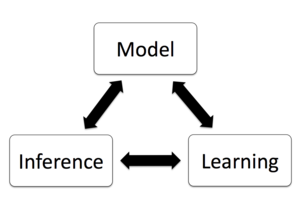Learning Inference Models for Computer Vision
2017
Ph.D. Thesis
ps
Computer vision can be understood as the ability to perform 'inference' on image data. Breakthroughs in computer vision technology are often marked by advances in inference techniques, as even the model design is often dictated by the complexity of inference in them. This thesis proposes learning based inference schemes and demonstrates applications in computer vision. We propose techniques for inference in both generative and discriminative computer vision models. Despite their intuitive appeal, the use of generative models in vision is hampered by the difficulty of posterior inference, which is often too complex or too slow to be practical. We propose techniques for improving inference in two widely used techniques: Markov Chain Monte Carlo (MCMC) sampling and message-passing inference. Our inference strategy is to learn separate discriminative models that assist Bayesian inference in a generative model. Experiments on a range of generative vision models show that the proposed techniques accelerate the inference process and/or converge to better solutions. A main complication in the design of discriminative models is the inclusion of prior knowledge in a principled way. For better inference in discriminative models, we propose techniques that modify the original model itself, as inference is simple evaluation of the model. We concentrate on convolutional neural network (CNN) models and propose a generalization of standard spatial convolutions, which are the basic building blocks of CNN architectures, to bilateral convolutions. First, we generalize the existing use of bilateral filters and then propose new neural network architectures with learnable bilateral filters, which we call `Bilateral Neural Networks'. We show how the bilateral filtering modules can be used for modifying existing CNN architectures for better image segmentation and propose a neural network approach for temporal information propagation in videos. Experiments demonstrate the potential of the proposed bilateral networks on a wide range of vision tasks and datasets. In summary, we propose learning based techniques for better inference in several computer vision models ranging from inverse graphics to freely parameterized neural networks. In generative vision models, our inference techniques alleviate some of the crucial hurdles in Bayesian posterior inference, paving new ways for the use of model based machine learning in vision. In discriminative CNN models, the proposed filter generalizations aid in the design of new neural network architectures that can handle sparse high-dimensional data as well as provide a way for incorporating prior knowledge into CNNs.
| Author(s): | Varun Jampani |
| Year: | 2017 |
| Department(s): | Perceiving Systems |
| Bibtex Type: | Ph.D. Thesis (phdthesis) |
| School: | MPI for Intelligent Systems and University of Tübingen |
| Links: |
pdf
|
|
BibTex @phdthesis{jampani:phdthesis,
title = {Learning Inference Models for Computer Vision},
author = {Jampani, Varun},
school = {MPI for Intelligent Systems and University of Tübingen},
year = {2017},
doi = {}
}
|
|


